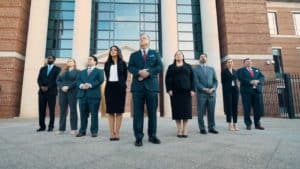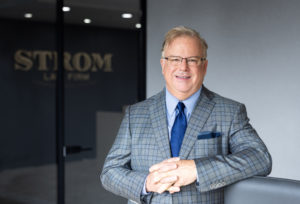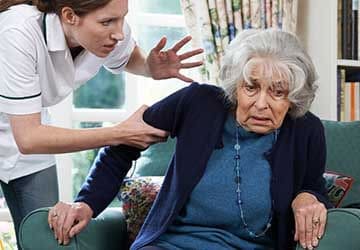Columbia Nursing Home Abuse Lawyers at Strom Law Firm
Nursing Home Abuse Attorneys in Columbia
Do you believe your loved one may have been intentionally or negligently abused while residing in a nursing home or residential care facility? Did you or a loved one suffer significant physical injuries while residing in a skilled or long-term care facility in South Carolina?
If so, call our Columbia Nursing Home Abuse Lawyers at Strom Law Firm to discuss a path forward with one of our experienced nursing home abuse attorneys. Nursing home injuries and abuse should not be taken lightly because you and your loved ones deserve the best care possible.
Recently, it was estimated that 2,200,000 people in the United States live in nursing homes and long-term care facilities. According to data from AARP, over 14% of South Carolina’s population, in excess of 85,000 people, are over 65 years of age. In the coming years, many of these individuals may require care in long-term residential and skilled nursing facilities. Nursing homes charge significant sums, promising assistance and needed care. Meanwhile, too many nursing home facilities and administrators fail to prioritize residential client care, from negligently hiring unqualified staff to inadequately monitoring, training, or otherwise providing necessary resources for nurses, staff, and other personnel. Alternatively, many assisted living homes overwork and underpay their nursing home staff. These unfortunate conditions sometimes, regrettably, lead to nursing home patients sustaining injuries from a practice called nursing home abuse or neglect.
Types of Nursing Facilities
There are several distinct types of nursing homes in South Carolina and across the Southeast and United States. The level of care required of facility clinical and nursing staff, personnel, and administrators varies greatly depending on the type of facility and the nursing home care offered.
- Skilled Nursing Facility: Following an accident, stroke, heart attack or other emergency circumstances requiring post-acute care, individuals will often be referred to a skilled nursing facility; these nursing homes typically require twenty-four hour access to care for residents and patients; these facilities also provide care for those patients whose clinical diagnoses require long-term management, including individual suffering from dementia and other memory disorders, and cardiac, respiratory, or vascular issues
- Residential Care Facilities: In general, residential care is community based care, where the residents and patients may expect a degree of privacy in their individual rooms, but where community space is offered for various group activities. Generally, a residential care facility will not be required to adhere to the heightened level of care available in a long-term or post-acute facility, but will still be responsible for adequate monitoring and control over communal spaces. In addition, in a residential care setting, a facility must ensure that residents remain “appropriate for care,” meaning that conditions and diagnoses remain stable and do not require transfer to a heightened care setting.
- Home-health care: While this is not, strictly speaking, a nursing facility, it is nevertheless skilled or nursing care provided to a patient on a daily or semi-regular basis, but administered in the patient’s home, or even in their long-term or residential care facility. Although this care may not be provided directly by a facility, staff who administer care in home-health settings must nevertheless adhere to the requisite level of care.
- Hospice: This care, known also as end-of-life care, is provided at a point when a patient or their family members have decided to cease curative care and switch to palliative or pain-reducing care; it is important to understand that hospice care is not intended to treat or cure disease, and it is also important to understand how electing this care may interact with certain other benefits or care available to a patient – for example, access to radiology or other examinations that are designated as “treatment.”
Regardless of the setting, each level of care includes various roles and responsibilities for those clinicians, nurses, administrators, technicians and assistants administering the care. In addition, these facilities and providers have been entrusted with access and monitoring over you and your loved ones. Nursing home residents should be their top priority. When these individuals fail to provide the appropriate level or amount of care, or when they fail to monitor or otherwise protect their residents, injuries, and harm can occur. Nursing home negligence is all too common, and it’s crucial to look for signs of neglect in Columbia nursing homes. When visiting nursing homes, you should keep an eye out for potential victims of abuse.
Forms of Nursing Home Abuse in Columbia
Signs of Nursing home abuse present themselves in a variety of ways, and it is important to remain vigilant as to these signs if you and your loved ones have made the difficult decision to use residential care. No amount of abuse is acceptable, but unfortunately, abuse, neglect, and other failures of long-term care facilities are common occurrences throughout nursing facilities in South Carolina.
South Carolina law expressly protects “vulnerable adults,” defined as any person eighteen years of age or older who has a physical or mental condition which substantially impairs the person from adequately providing for his or her own care or protection. This includes a person who is impaired in the ability to adequately provide for the person’s own care or protection because of the infirmities of aging including, but not limited to, organic brain damage, advanced age, and physical, mental, or emotional dysfunction. A resident of a facility is a vulnerable adult. The law related to vulnerable adults can be found at S.C. Code Ann. Section 43-35-5, et seq., which is known as the South Carolina Omnibus Adult Protection Act. This act also defines “abuse” and “neglect”.
The following are examples of different types of abuse that might occur at a residential or long-term care facility:
- Neglect – Examples include: not providing proper nutrition, failing to provide medication, unsanitary conditions, isolating residents, falls and accidents, and failure to provide adequate skincare, which can result in bedsores known as pressure injuries or decubitus ulcers.
- Financial abuse – Facilities have specific responsibilities to safeguard and appropriately use resident funds and not charge unexpected fees or uncalled for expenses.
- Physical altercation – As hard as it is to believe, some forms of abuse include various injuries caused by punching, pushing, holding or tying down, slapping, restrains, or other forms of physical abuse.
- Sexual assault and abuse – Though it seems horrific to consider, there have been reports of employees and personnel of facilities engaging in sexual abuse and molestation of residents and patients, for example, in memory units where resident impairment may make detection of the abuse more difficult;
- Emotional abuse – Any words that emotionally harm a resident, including threats, belittlement, etc.
Signs of Abuse and Neglect in a Nursing Home

FAQs about Nursing Home Abuse and Neglect in South Carolina
What can I do if I suspect my loved one has been the subject of abuse or neglect in a Columbia Nursing Home?
Several options may be available to you if you suspect that you or your loved one have been the subject of improper care, abuse, or neglect. You can report the conduct to the South Carolina office of the Ombudsman and can also file a complaint with South Carolina Department of Health and Environmental Control (DHEC), the South Carolina agency charged with oversight and inspection of long term and residential care facilities. Either entity may initiate an investigation, and the results of that investigation can be important in helping to establish a claim against a nursing home facility. Victims can also get the help of a nursing home abuse attorney to file their claim.
What signs should I be aware of if I suspect my loved one has been the victim of nursing home abuse or neglect?
It may be difficult to determine if your loved one has been harmed by nursing home abuse or neglect. Some signs of abuse to consider, however, are loss of appetite, weakness, delirium, confusion, agitation, skin deterioration or tearing, or unusual odors.
What rights does my loved one have as a resident of long-term or residential care facility?
Just as South Carolina law expressly protects vulnerable adults, the law also provides a resident bill of rights for residents of long-term care facilities. This bill of rights expressly requires residents to be given care consistent with their privacy, dignity, and respect. Here is a link to the full bill of rights: https://www.scstatehouse.gov/code/t44c081.php
What are common cases alleging Columbia nursing home abuse or neglect?
Cases against nursing homes can vary widely, but many involve issues with providing adequate skin or nutritional care or otherwise failing to provide sufficient treatment. For example, a resident may develop a significant pressure injury while in the care of a nursing facility or may develop a preventable infection because of an untreated UTI. Some other common types of nursing home cases include:
- Physical abuse;
- Emotional abuse;
- Sexual abuse;
- Financial abuse.
How common is nursing home abuse or neglect in Columbia?
It is nearly impossible to tell every instance of nursing home abuse or neglect in South Carolina. According to statistics, in 2019 alone, the South Carolina Adult Protective Services Agency accepted over 5,000 complaints involving complaints of third-party elder abuse or neglect.
Is there a difference between nursing home medical negligence and abuse or neglect?

My loved one sustained an injury while they were a resident of a long-term care facility. Does the facility have any responsibility to report the injury?
Yes. Certain outcomes and adverse incidents must be reported within a short timeframe by the facility to DHEC. Failure to accurately report these accidents can constitute an offense in and of itself. All long-term and skilled nursing facilities are responsible for ensuring accurate reporting about accidents at their facility, as well as to authorize access by DHEC or the applicable authorities to records and facilities upon request.
If my loved one has suffered injuries but is still a resident of the facility, should I be concerned that the facility will retaliate?
No. At the outset of residency, the facility should have specified how termination of residency can occur, and retaliation for filing a claim related to abuse, neglect, or potential medical negligence should not be among the reasons a nursing facility can terminate residency.
How long do I have to bring a claim for nursing home medical negligence, abuse, or neglect?
The length of time to bring a claim varies depending on the type of facility. Contacting an experienced nursing home abuse or neglect attorney can be critical in determining your rights and the timeframe for filing a claim.
Are there any special requirements for filing an abuse, neglect, or nursing home medical negligence claim in Columbia?
Depending on the allegations, some claims against long-term care and skilled nursing facilities may require an expert to identify the applicable standard of care and ways that the facility fell below that standard. The nursing home medical negligence, and abuse and neglect attorneys at the Strom Law Firm can talk to you about whether your potential case requires an expert.

If you or a loved one have been the victim of abuse, neglect, or nursing home medical negligence, contact the attorneys at Strom Law Firm, LLC today for a free consultation with a lawyer to discuss the facts and circumstances of your potential case. We will work on your behalf to secure justice for you and your family.
-
Contact Our Skilled Columbia Nursing Home Lawyers Today
If your loved one has been abused in a Nursing Home or Residential care facility in Columbia, Richland County, or anywhere else across South Carolina, contact us. Our Columbia personal injury lawyers offer free case evaluations, and we do not collect a fee unless we recover for you. Contact our nursing home neglect lawyers at 803-252-4800 and find out if we are able to help you.



















